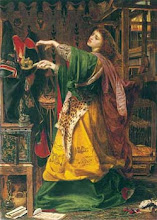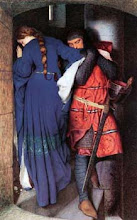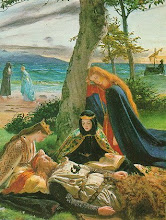Myrddin Wilt, if he does yet breathe, can be found in the Forest of Celyddon. Although some say he is merely a figure of legend, it may be less than prudent to concur with the doubters. After all, they were the men who dismissed the story of Myrddin’s magicking of Stonehenge from across the seas and we know now that the monument’s stone came from a quarry that is indeed across a sea, across the Cardigan Bay, on the southern coast of Wales. Such disbelief, however, is not uncommon in the treatment of this man of the woods. His life, to this point, has not been one of ease, but has been marked, yes, by madness but also by a never-ending struggle against those who would sleight his essential nature, even going so far as to attempt to kill him for it.
The Bard
by Thomas Jones
His nature is as his name indicates, Wild, or Of the Woods. Once a prince in the world of men, he rules over the forest as king. He speaks the tongues of animals and they listen to him as they listened to Adam, Noah, and the early men of this earth. The society of his animal companions, sometimes the pig, sometimes the wolf, is the only society that Myrddin can withstand for the world of men has driven him to despair and madness. Much has been made of his madness, which unmoored his mind’s eye so that rather than experience the world in the present, as the mass of men do, he sees the future relentlessly unfolding before him. To hear him speak of the future is to put oneself in peril, for, as it is commonly known, foreknowledge is a grave danger to all sane men who encounter it.
Myrddin was, before prophecy struck him, a great lord of the Welsh people, the bearer of a golden torque. He was terrible to meet in battle and his prowess inspired awe from his enemies and friends alike. He had a wife whom he loved dearly and who was deeply enamored of him and his powerful figure. He was, from all accounts, well spoken and well spoken of at court, though he harbored great hostility toward the Christian missionaries who had taken to trumpeting their new faith throughout the land. It might have been because of this animosity that he went mad, though the accounts all differ as to how it happened. What is certain is that he was never the same after the Battle of Arfderydd.
Merlin
by Aubrey Vincent Beardsley
The Battle of Arfderydd was fought on the plains of Scotland before Scotland was known by such a name, between the rivers of Liddel and Esk. Assembled on the field that day were the hosts of the Welsh’s two most mighty warlords, Rhydderch Hael, a Christian ruler, and Gwenddolau, a devotee to the old Gods and Myrddin’s liege lord. It is during this clash of titans that the Gods touched Myrddin. According to some records, he was cursed by one of Rhydderch’s Christian clerics. Others say that it was his discovery that he had slain his sister’s children in the fight that plunged him into turmoil. Some warriors bearing scars from the battle tell of celestial figures that howled Myrddin’s name and chased him from the field of combat, while an equal contingent claim that the champion simply laid down his weapons and walked away from the bloodshed.
Oh blissful dam
if you saw
the sheer violence
that I saw,
you wouldn’t sleep in the morning,
you wouldn’t dig the hillside
you wouldn’t make for the wild
by a desolate lake.
~~ “The Ohs of Myrddin,” The Black Book of Carmarthen
Merlin
by Rick Wakeman
Away from the moans of the dying and injured, away from the grunts of the soldiers exhausting themselves in the attempt to kill their enemy, in the attempt to stay alive themselves, away from the horrible accusatory silence of the corpses, of the cloven heads that bobbed in estuaries of blood, away from that silence, that silence! and into the woods went Myrddin. Off into the wild he flew “like any bird of the air,” if the Gaelic record The Frenzy of Suibhne is to be believed. He landed in an apple-tree in the Forest of Celyddon and was to stay there for many years. In that forest, the forest where the madmen searched for their sanity, he lived with the animals. He slept in the boughs of the oak trees and lived on a diet of nuts and vegetables. It was among the animals that he hid as he sought protection from King Rhydderch who he was certain was trying to kill him. It was to the animals that he foretold the coming of Cadwaladyr, the great King who would unite the Britons and bring peace. It was to the animals that he spoke as he attempted to find peace with the violence of his kind.
Perhaps it is this preference of the world of animals to the world of men, the possibility that Myrddin harbors deep reservations about humankind, that spurs some chroniclers to deny him his madness, to deny him his time in the forest. Believe it if you wish, but there certainly seems to be a coterie dedicated to extirpating him, or at least Myrddin as he truly is, from the records. Geoffrey of Monmouth not only Latinized the Welsh, changing Myrddin to Merlinus (lore has it that he chose this name because Merdinus—the logical Latinization—would have been too closely associated with the Anglo-Norman word for shit, merde) but he also expunged Myrddin’s madness and his sylvan life completely in his Historia Regum Britanniae. In fact, this “Merlin” was prescient from his earliest days, always able to divine the future’s truth, and is brought to the court of King Vortigern when yet a child. Geoffrey did try to amend his factual errors with his later work, Vita Merlini, in which he does recognize Myrddin’s time in the forest and the horrific genesis of his foresight, but the process of recasting Myrddin as Merlin, of siphoning away the man’s spirit to feed a fantasy was begun.
Merlin's study
In one account of his madness from the Gaelic tradition, Myrddin brings his madness upon himself by trying to spear a cleric after the cleric sprinkles him with holy water. It seems that the Welshman had found the ritual to be insulting. Close to six hundred years after this event, Robert de Boron, a deeply Christian French poet of the late 12th century, completed the cleric’s work—or at least did so in writing. Through his Merlin, he began to convince Europe that the man was a Christian. The unknown father in Geoffrey of Monmouth’s account becomes a demon and Myrddin’s otherwise troublesome paganistic aspects could be neatly explained away as the result of his devilish heritage. But his demonic blood, manifested in his full head of hair—a sign of his bestial associations—and his perfect knowledge of the past, which could be no other than a full acquaintance with pagan lore, is counteracted by his acceptance of the Christian faith. His mother has him baptized, neutralizing the threat of ungodliness and transforming the troubled antichrist into a leader of the Christian world. Gifted by God with knowledge of the future (for Christianity’s God is the future as Boron takes pains to make evident), Merlin spends his life as the courtly adviser to King Arthur and his knights. By Boron’s book, Merlin’s prophecies and magical powers are useful tools in creating the most perfect Christian world possible. Discounting a brief time masquerading as a shepherd so that he can usher Arthur into the world, the woods, the wilderness, the outdoors, seem to have been successfully exorcised from his person. De Boron’s account presents as self-evident the obviously false idea that Merlin was a man of the courts rather than of the woods.
In fact, when Myrddin is removed from his arboreal kingdom, it is known that he becomes terribly depressed and is prone to retaliate against his captors with awful pronouncements. Geoffrey of Monmouth, referencing earlier records, tells of Myrddin being captured by his sister, Queen Ganieda, and being brought back to court. There, he refuses to speak a word about his experiences and suffers civilization in silence. That is, until one day, when he sees the King Rodarcus, his sister’s husband, remove a leaf from his sister’s hair. He laughs and there is a quality to the laugh that like the fury of a waterfall about to crash against the rocks, excites and frightens the King so that he must know why the madman is laughing. The King will give him anything to know, to know, from whence this secret mirth bubbles, finally promising to allow Myrddin to return to the woods. The response though, could not have brought joy to Rodarcus for Myrddin tells him that the leaf became entangled in her locks when she lay in the woods with her lover. Myrddin tells the King that his great love for his wife is unrequited. She loves the man with whom she lay that morning under the trees of Myrddin’s forest. And then Myrddin laughs because he shall be free.
The records of other men exposed to Myrddin’s prophetical voice are equally joyless. In one account, Myrddin orders his wife to remarry—his love for nature leaves no room for any other—on one condition: that he never lay eyes on her husband. On the day of her marriage, he comes riding to her, astride a great stag, shepherding herds of animals that he desires to give to her. However, as she comes out to meet him, her husband catches sight of Myrddin and laughs at the man riding a deer. Like thunder is to lightning so is laughter the warning that Myrddin is about to strike. If you hear the sound in his presence, it is best to leave as quickly as possible. Myrddin, hearing the laughter, knows exactly who makes such noise and, turning to look at the man, flies into a rage in which he tears the horns from his stag and assaults the bridegroom with them. And then he disappears back into the shadows of the forest.
The Myrddin that rides off in a burst of speed, astride his bloody steed, slicked with sweat from the exertion of ripping the antlers from his mount, lost in the exhilaration of dramatic action, is a far cry from contemporary depictions. The man who crushes his wife’s betrothed with a blow of the antlers is a virile, albeit chaste, being. He is strong and powerful, a warrior who simply chooses not to fight, a noble savage, not the doddering octogenarian in which his spirit—whatever is left of it at least—has been incarnated. Sir Thomas de Malory introduces this misconception in his romance, La Morte D’Arthur, as he writes that Merlin, after being ignored by Arthur when appearing as “a child of fourteen year of age,” “came again in the likeness of an old man of four-score years of age, whereof the king was right glad, for he seemed to be right wise.” After Malory, the choice that Merlin makes to assume “the likeness” of an old man is forgotten. The association between age and wisdom becomes primary. He becomes an old man because he is the wise councilor. Age, rather than the touch of madness, becomes the font of wisdom and Myrddin Wilt finds himself further effaced.
Becoming thirsty, Merlin leaned down to the stream and drank freely and bathed his temples in its waves, so that the water passed through the passages of bowels and stomach, settling the vapours within him, and at once he regained his reason and knew himself, and all his madness departed and the sense which had long remained torpid in him revived, and he remained what he had once been—sane and intact with his reason restored. (Vita Merlini, Geoffrey of Monmouth)
It is recorded by Geoffrey of Monmouth, even if the surviving Welsh poems do not acknowledge it, that Myrddin does eventually recover his sanity by drinking from a newly born stream. Restored to his senses, though still empowered with the vision that his madness had wakened, it is said that his first action was to praise nature. For Myrddin, there is nothing that can compare with the world of the forest. The forest is Myrddin’s home. There he lives and there he one day shall die.
Thomas Malory’s La Morte D’Arthur tells of how the lady of the lake refuses Merlin’s love because she was “aferde of [Myrddin] for cause he was a devyls son.” This sentiment seems to characterize Merlin’s later “chroniclers” as well. They are afraid of Myrddin’s true nature. They age him, remove him from his natural habitat, and create a force to tame him—Vivien’s seductive charms. However, even in such stories as that of Malory and Alfred Lord Tennyson’s “Merlin and Vivien” they cannot deny his sylvan roots. Even if they remove him from his life’s rightful realm, they allow him to return there for his eternal sleep. Even if they cloud his reason with lust for the lady of the lake, they are unable to do away with all of his aboriginal tendencies. Malory tells of how Merlin returns to the earth, how he goes “under the stone to let [the lady of the lake] wit of the marvels there, but she wrought it so that for him he never came out.” Alfred Lord Tennyson, while reducing dignified Myrddin to lecherous Merlin, an old man allowing the needs of his “dying flesh” to lead him into doom, depicts the final moments of Merlin’s life as occurring among “the ravaged woodland” and ends the poem with Merlin sleeping forever not simply within the forest, but within a tree: “in the hollow oak he lay as dead, / And lost to life and use and name and fame.”
So Merlin, Myrddin, is sentenced to sleep. The fantasists—Monmouth, de Boron, Malory, Tennyson—are unable to destroy his presence. His animal magnetism is too robust, too vibrant, too wild, to be fully washed away by the waters of baptism nor predictable enough to be channeled properly in the world of the court. And so they invent the myth of his lust to draw him out of the court, back into his wild world of the forest and there sentence him to sleep, not death—they do not have that power of the pen—and they proceed with the stories that they are interested in telling. They chained him to their purposes, forced him to usher Arthur into the world and to his throne, all the while denying Myrddin his own true history. And then they cast him off, back into the forest from whence he came. But, Myrddin, even in his sleep, even as they have imagined him, laid to rest in a tomb encased by earth or oak, remains their nightmare, the specter of the natural world, not yet bent over by Christ or civilization. He haunts them like wolves circling just beyond the light of a campfire; they cannot distinguish the forms but they can feel the presences. In response, they crowd closer around the fire. On the outskirts of their minds, hidden in the caves that they have long since run from, they know he, Myrddin, is waiting with the knowledge that primeval nature is not something to be afraid of—simply to respect—and that terrifies them even more.
When I remain under the green leaves the riches of Calidon delight me more than the gems that India produces, or the gold that Tagus is aid to have on its shore, more than the crops of Sicily or the grapes of pleasant Methis, more than lofty turrets or cities girded with high walls or robes fragrant with Tyrian perfumes. Nothing pleases me enough to tear me away from my Calidon which in my opinion is always pleasant. Here shall I remain while I live, content with apples and grasses, and I shall purify my body with pious fastings that I may be worthy to partake of the life everlasting. (Vita Merlini, Geoffrey of Monmouth)
Myrddin Wilt, if he does yet breathe, can be found in the Forest of Celyddon. Perhaps he is singing, for he is, they say, as gifted in voice as the famed Taliesin of the golden brow. But, if he has died in the centuries since he was last beheld by mortal mind, if the word-sorcerers de Boron and Malory have succeeded in stealing his soul to animate their fantastical courtier-counselor, Merlin the magician, and Myrddin Wilt has sunk into slumber, then, it is said, wait for the time of the great King Cadwaladyr’s return, when the steel cages shall crash to the ground, the black tar shall be uprooted, the endless fires shall be extinguished, the silver dragons that belch smoke into the sky slain, and Myrddin Wilt shall once again walk with the lonely wolf, ride the crownless stag, and speak prophecy to the pig.
Merlin and Nimue
by Sir Edward Burne-Jones
http://www.theharvardadvocate.com/content/myrddin-wilt-myrddin-emrys-merlinus-silvestri-merlinus-celidonus-merlinus-ambrosius-merlin-b


































0 comments:
Post a Comment